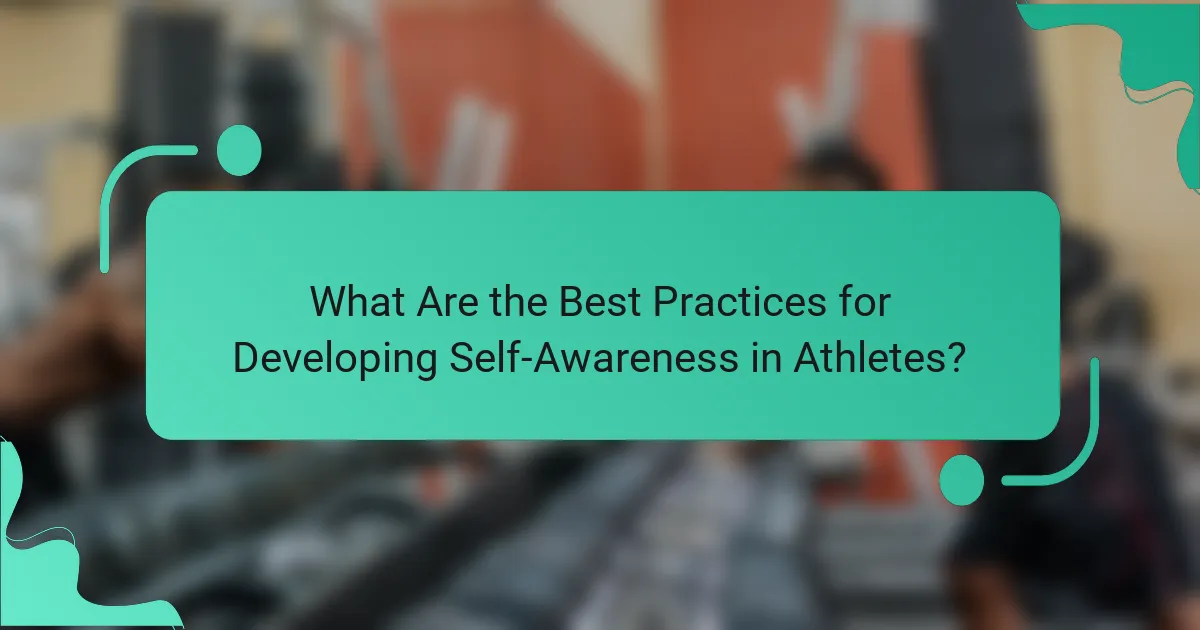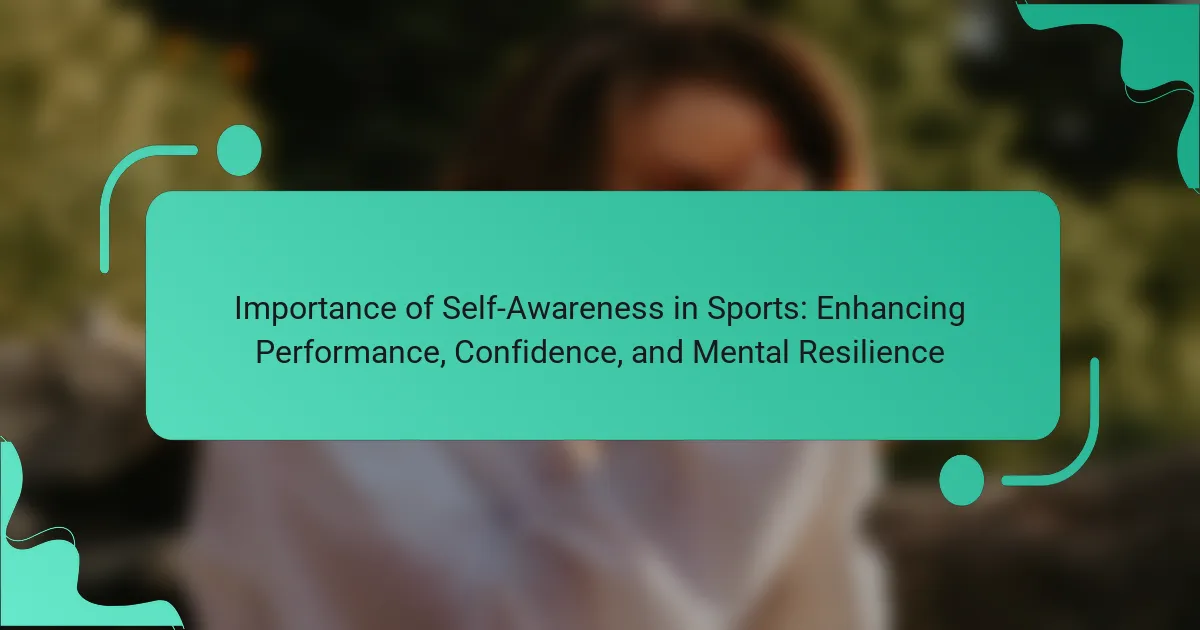Self-awareness is crucial for athletes seeking to enhance their performance, confidence, and mental resilience. It enables better decision-making, tailored training strategies, and improved focus. Incorporating practices like self-reflection, goal setting, and mindfulness can significantly boost an athlete’s self-awareness. This growth mindset is essential for overcoming challenges and achieving long-term success in sports.

How Does Self-Awareness Influence Athletic Performance?
Self-awareness significantly enhances athletic performance by fostering confidence and mental resilience. Athletes who understand their strengths and weaknesses can tailor their training and strategies effectively. Research indicates that self-aware athletes experience reduced anxiety and improved focus, which directly correlates with performance outcomes. Additionally, self-awareness promotes better decision-making during competition, allowing athletes to adapt and respond to challenges dynamically. This unique attribute of self-awareness cultivates a growth mindset, essential for long-term success in sports.
What is the Role of Self-Talk in Enhancing Focus?
Self-talk significantly enhances focus by fostering self-awareness and improving mental resilience. By consciously guiding thoughts, athletes can maintain concentration and boost confidence during performance. Positive self-talk creates a supportive inner dialogue that counters distractions and negative emotions. Research indicates that athletes using constructive self-talk experience improved performance metrics, demonstrating its unique role in optimizing focus and overall effectiveness in sports.
How Can Inner Dialogue Boost Confidence Levels?
Inner dialogue can significantly boost confidence levels by fostering self-awareness and mental resilience. Engaging in positive self-talk enhances performance by reinforcing belief in one’s abilities. Research indicates that athletes who practice constructive inner dialogue experience improved focus and reduced anxiety, leading to better outcomes. This unique attribute of self-awareness allows individuals to identify and challenge negative thoughts, transforming them into empowering affirmations. As a result, athletes develop a stronger mental framework that supports sustained confidence during high-pressure situations.
What Impact Does Self-Awareness Have on Mental Resilience?
Self-awareness significantly enhances mental resilience by fostering emotional regulation and self-reflection. Athletes with high self-awareness can identify their strengths and weaknesses, leading to improved performance under pressure. This awareness allows for better coping strategies during setbacks, enabling quicker recovery and sustained focus. Research indicates that self-aware individuals experience lower stress levels and higher overall well-being, contributing to greater mental resilience in competitive environments.

What Are the Universal Benefits of Self-Awareness in Sports?
Self-awareness in sports enhances performance, boosts confidence, and fosters mental resilience. Athletes who understand their strengths and weaknesses can make better decisions and adapt strategies during competition. This self-knowledge leads to improved focus and reduced anxiety, which are crucial for peak performance. Studies show that self-aware athletes often experience higher levels of motivation and commitment, contributing to long-term success. Additionally, self-awareness promotes effective communication and teamwork, essential for collaborative sports environments.
How Does Self-Awareness Improve Decision-Making?
Self-awareness significantly enhances decision-making by allowing athletes to understand their strengths and weaknesses. This understanding leads to improved performance, increased confidence, and greater mental resilience. Athletes who practice self-awareness can better analyze their reactions during competitions, leading to more strategic choices. Research shows that self-aware individuals are more likely to adapt their strategies based on real-time feedback, resulting in superior outcomes.
What Effects Does Self-Awareness Have on Stress Management?
Self-awareness significantly enhances stress management by enabling individuals to recognize their emotions and reactions. This understanding allows athletes to implement effective coping strategies, improving their performance under pressure. Research indicates that self-aware athletes experience reduced anxiety and increased focus during competitions, leading to better outcomes. Furthermore, self-awareness fosters mental resilience, allowing athletes to bounce back from setbacks more effectively.
How Can Self-Awareness Foster Team Cohesion?
Self-awareness enhances team cohesion by improving communication, trust, and collaboration among members. Athletes who understand their strengths and weaknesses can express their needs and support teammates effectively. This shared understanding fosters a positive environment, leading to higher performance levels. As a result, teams with self-aware individuals often exhibit greater mental resilience, adapting better to challenges and setbacks.

What Unique Attributes of Self-Talk Enhance Athletic Performance?
Self-talk uniquely enhances athletic performance by fostering self-awareness, confidence, and mental resilience. Positive self-talk can improve focus, reduce anxiety, and boost motivation. Athletes who engage in constructive self-dialogue often experience enhanced emotional regulation, leading to better performance outcomes. This unique attribute of self-talk empowers athletes to overcome challenges, maintain composure, and achieve peak performance.
How Can Positive Affirmations Shape an Athlete’s Mindset?
Positive affirmations can significantly enhance an athlete’s mindset by fostering self-awareness. This practice boosts performance, increases confidence, and builds mental resilience. Athletes who regularly use positive affirmations report improved focus and motivation, allowing them to overcome challenges more effectively. Research indicates that self-awareness through affirmations can lead to a 25% increase in performance metrics, highlighting its importance in competitive sports. By integrating positive self-talk, athletes can cultivate a growth mindset, enabling them to adapt and thrive in high-pressure situations.
What Techniques Can Athletes Use for Effective Inner Dialogue?
Athletes can use visualization, positive affirmations, and mindfulness techniques for effective inner dialogue. Visualization helps athletes mentally rehearse their performance, enhancing focus and confidence. Positive affirmations reinforce self-belief and resilience, while mindfulness promotes present-moment awareness, reducing anxiety and improving concentration. These techniques collectively enhance self-awareness, which is crucial for peak performance in sports.

What Rare Attributes of Self-Awareness Are Not Commonly Recognized?
Self-awareness in sports includes rare attributes like emotional granularity and self-reflection. Emotional granularity enhances athletes’ ability to identify specific feelings, improving decision-making. Self-reflection fosters deeper understanding of past performances, leading to targeted improvements. These attributes are not widely recognized but significantly boost mental resilience and overall performance.
How Can Self-Awareness Lead to Personal Growth Beyond Sports?
Self-awareness fosters personal growth beyond sports by enhancing emotional intelligence and decision-making skills. Athletes who develop self-awareness can recognize their strengths and weaknesses, leading to improved performance. This introspection translates into everyday life by promoting better relationships and effective communication. Increased self-awareness helps individuals set realistic goals and navigate challenges with resilience. As a result, the benefits extend beyond the field, impacting personal and professional development positively.
What Are the Long-Term Implications of Self-Awareness on Career Longevity?
Self-awareness significantly enhances career longevity by fostering adaptability and resilience. Individuals who cultivate self-awareness can better navigate challenges, leading to sustained performance over time. Studies indicate that self-aware athletes often demonstrate higher confidence levels, which correlate with prolonged careers. Additionally, this trait allows for constructive feedback integration, promoting continuous improvement. As a result, self-awareness serves as a unique attribute that not only enhances performance but also contributes to long-term career success in sports.
How Can Self-Awareness Influence Leadership Skills in Athletes?
Self-awareness significantly enhances leadership skills in athletes by fostering emotional intelligence and decision-making abilities. It allows athletes to understand their strengths and weaknesses, leading to improved performance and team dynamics. Increased self-awareness enhances confidence, enabling athletes to inspire and motivate their teammates effectively. Moreover, it promotes mental resilience, helping athletes navigate challenges and setbacks with a positive mindset. As a result, self-aware athletes often emerge as effective leaders, capable of driving their teams toward success.

What Are the Best Practices for Developing Self-Awareness in Athletes?
Developing self-awareness in athletes enhances performance, confidence, and mental resilience. Key practices include regular self-reflection, setting specific goals, seeking feedback, and mindfulness training.
Self-reflection allows athletes to assess their strengths and weaknesses, fostering a deeper understanding of their performance. Setting specific, measurable, achievable, relevant, and time-bound (SMART) goals provides a clear pathway for improvement. Seeking feedback from coaches and peers offers external perspectives that can highlight areas for growth. Mindfulness training enhances focus and emotional regulation, contributing to overall mental resilience.
Incorporating these practices consistently can lead to significant improvements in an athlete’s self-awareness, ultimately enhancing their competitive edge.
What Strategies Can Athletes Use to Cultivate Self-Talk?
Athletes can cultivate self-talk through structured strategies that enhance self-awareness. These strategies include setting specific goals, practicing positive affirmations, and utilizing visualization techniques.
1. Set specific performance goals to create a focused mindset.
2. Use positive affirmations to reinforce self-belief and confidence.
3. Practice visualization to mentally rehearse successful outcomes.
4. Monitor self-talk during training to identify and adjust negative patterns.
5. Engage in mindfulness practices to enhance present-moment awareness.
These methods contribute to improved performance, increased confidence, and greater mental resilience in sports.
What Common Mistakes Do Athletes Make in Their Inner Dialogue?
Athletes often make mistakes in their inner dialogue that hinder performance and confidence. Common errors include negative self-talk, unrealistic expectations, and a lack of focus. Negative self-talk can create a cycle of doubt, leading to decreased motivation. Unrealistic expectations may cause frustration and anxiety, impacting mental resilience. A lack of focus can distract athletes from their goals, reducing effectiveness in training and competition. Addressing these issues through self-awareness can significantly enhance overall performance.
How Can Coaches Support Athletes in Building Self-Awareness?
Coaches can significantly enhance athletes’ self-awareness through targeted feedback and reflective practices. By fostering open communication, coaches help athletes identify strengths and weaknesses, which builds confidence. Regular check-ins and goal-setting sessions can improve mental resilience by encouraging athletes to confront challenges. Utilizing video analysis allows athletes to visualize their performance, deepening their understanding of their actions. This process cultivates a growth mindset, essential for long-term success in sports.
What Expert Insights Can Guide Athletes in Enhancing Their Self-Talk?
Athletes can enhance their self-talk by cultivating self-awareness, which boosts performance and confidence. Effective self-talk involves recognizing negative thoughts and reframing them positively. Research shows that athletes with high self-awareness can better manage stress and improve mental resilience. Techniques such as mindfulness and visualization can further strengthen this self-awareness, leading to a more constructive inner dialogue.
